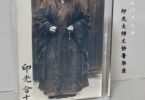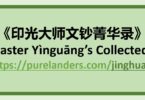From ‘What The Master Does Not Speak’《子不语》 , which is a collection of 747 strange events by the Qīng Dynasty scholar Yuánméi (袁枚) in 1788, is this fascinating tale titled ‘Ghosts Have Three Tricks, (With Passing Of These Ghostly Ways Thus With Them Ended)’《鬼有三技(过此鬼道乃穷)》, with additional explanatory notes.
The Official Càiwèi, who was a Xiàolián (i.e. successful second degree candidate) often said, ‘Ghosts have three tricks. The first is to confuse (and seduce). The second is to obstruct. The third is to scare.’ (蔡魏公孝廉常言:「鬼有三技:一迷二遮三吓。」)
When asked, ‘What are the three tricks?’, he said, ‘I have a younger male cousin from my mother’s side, a certain Lǚ, who is Sōngjiāng’s government granary’s scholar. With his nature bold and unconstrained, he self-titled himself as Mister Huōdá [i.e. the magnanimous, clear-headed and carefree gentleman]. (或问:「三技云何?」曰:「我表弟吕某,松江廪生,性豪放,自号豁达先生。」)
[Note 1: ‘Mister Huōdá’ has since become an idiomatic expression to describe those of similar character.]
He once passed by Lake Mǎo’s Western village. The sky was gradually darkening, when he saw a woman, with her face applied with powder and her eyebrows with liner, who hastily grasped a rope and was running. Spotting Lǚ, she ran away to avoid him by going under a big tree, while that held rope was then left behind, with it falling on the ground. (尝过泖湖西乡,天渐黑,见妇人面施粉黛,贸贸然持绳索而奔。望见吕,走避大树下,而所持绳则遗坠地上。)
Lǚ took it and saw that it was only a straw rope. Smelling it, it had an air of darkness and unhappiness. In his mind, he knew her to be the ghost of one who has died by hanging. Taking and hiding it in his bosom, he directly walked forward. (吕取观,乃一条草索。嗅之,有阴霾之气。心知为缢死鬼。取藏怀中,径向前行。)
[Note 2: This was probably done to prevent the ghost from using the rope, which she probably used to hang herself, to hang someone else.]
That woman, from the tree within, came forward to obstruct him. With him to the left walking, then at the left hindering. With him to the right walking, then at the right hindering. As Lǚ in his mind knew that this is that commonly called a “ghostly playing the rotating wall”, he charged straight and walked towards her. (其女出树中,往前遮拦,左行则左拦,右行则右拦。吕心知俗所称鬼打墙是也,直冲而行。)
[Note 3: Another version of this phenomenon is to be tricked by ghostly illusions to become lost by going in circles (打转).]
The ghost was helpless on what to do, and with a long scream, changed to have a form with dishevelled hair and dripping blood. Extending her tongue to perhaps a chǐ long, [which is one-third of a metre], she leapt towards him. (鬼无奈何,长啸一声,变作披发流血状,伸舌尺许,向之跳跃。)
Lǚ said, “You before this, with daubing of eyebrows with liner and painting of face with powder, was to confuse (and seduce) me. Coming forward to hinder and repel, was to obstruct me. Now creating this evil form, is to scare me. With your three tricks now exhausted, after all, I am still not afraid, and think you are without any other tricks that can be carried out. Do you also know I am commonly named Mister Huōdá?” (吕曰:『汝前之涂眉画粉,迷我也;向前阻拒,遮我也;今作此恶状,吓我也。三技毕矣,我总不怕,想无他技可施。尔亦知我素名豁达先生乎?』)
[Note 4: The easiest way to instantly and fully protect oneself from malevolent ghosts is by being sincerely mindful of Āmítuófó’s name – be it aloud or in one’s mind.]
The ghost restored her original appearance, knelt to the ground, and said, “I am a woman from the city centre with the surname of Shī, who with my husband had a quarrel, and accidentally committed suicide by hanging myself. Now having heard that to the East of Lake Mǎo has a certain family’s wife, who is also not getting along well with her husband, thus am I going towards there to obtain a substitute. (鬼仍复原形跪地曰:『我城中施姓女子,与夫口角,一时短见自缢。今闻泖东某家妇亦与其夫不睦,故我往取替代。)
[Note 5: She was attached to the old and dangerous misconception that one who died accidentally must kill someone, to die in one’s place, to become a ‘death-substituting ghost’ (替死鬼), before one can be reborn. This explains why there are some violent ghosts, who nevertheless do not attain good rebirths, while accumulating great negative karma by harming and killing others. Thus, without guidance, they might attain even worse rebirths, by falling lower in the lower realms.]
Unexpectedly, halfway, I was by Mister cut off and stopped, also with my rope snatched away. As I am truly without any more methods, I can only beg Mister to deliver me for rebirth.” (不料半路被先生截住,又将我绳夺去。我实在计穷,只求先生超生。』)
Lǚ asked, “By using what method for deliverance?” She said, “On my behalf, do inform the Shī family in the city centre, to create a place for practice, and invite high monastics, to chant more of the Rebirth Mantra, so that I can then be reborn.” (吕问:『作何超法?』曰:『替我告知城中施家,作道场,请高僧,多念《往生咒》,我便可托生。』)
[Note 6: The Rebirth Mantra is for uprooting all karmic obstacles (拔一切业障根本) and for attaining birth in Āmítuófó’s (阿弥陀佛) Pure Land (得生净土). However, if recited by others, only one-seventh of the meritorious virtues (功德) created can be dedicated (回向) to those in mind.
Thus, for direct and full benefits, one should recite it personally and sincerely. For reaching Pure Land, there has to be the Three Provisions (三资粮) of Faith, Aspiration and Practice (信愿行) personally given rise to, whether the Practice is by reciting the mantra, or even more easily, the concise name of Āmítuófó.
Thus, even high monastics cannot chant for others, to fully eradicate their negative karma, or to guarantee that they can reach Pure Land. What they can offer is some meritorious virtues for alleviating suffering, and guidance, with their good examples, to inspire those to be helped, to also practise the above, just as sincerely, for the ideal results.]
Lǚ laughed and said, “I, right away am a ‘high monastic’. As I have a ‘Rebirth Mantra’, I will for you recite it once.” (吕笑曰:『我即高僧也。我有《往生咒》,为汝一诵。』)
[Note 7: As he was clearly a layperson, he was obviously joking, yet doing so to capture her attention, for what he is about to say.]
Immediately, he loudly sang, “How big is this world, without obstructions and without obstacles. With death going and birth coming, how can there be a substitute? Wanting to go then going, how can one be not carefree and happy?” (即高唱曰:『好大世界,无遮无碍。死去生来,有何替代?要走便走,岂不爽快?』。)
[Note 8: This is obviously not the mantra, but it did have some equivalent beneficial effects, of guiding her to cease creating of more negative karma, to repent existing negative karma, and to move on with peace of mind, for a swift and hopefully better rebirth.
The poem served to address her misconceptions. First, it told her that as the world is so big, there is no one and nothing, that can really obstruct her from departing from her miserable state, to have a better rebirth – other than her own attachment, aversion and delusion (贪嗔痴). Just as she was blocking his way, he could either go through or around her. While trying to obstruct him to get what she craved but did need, she was actually obstructing herself, going in circles. This was her self-created ‘ghostly rotating wall’, that trapped herself.
Second, it told her that as the karmic cycle of birth and death is always personally experienced, no one can replace another in the process. Thus, it was pointless to find someone to die on her behalf, especially since she has already died, which she should graciously accept.
Third, it told her that she should simply make peace, to be reborn readily, straightforwardly and cheerfully – though ideally with sincere mindfulness of Āmítuófó, for the best rebirth.]
The ghost, having heard this completely, suddenly had a great realisation, prostrated with repeated bows, and quickly fled to leave. (鬼听毕,恍然大悟,伏地再拜,奔趋而去。)
[Note 9: This is her expression of understanding, repentance and gratitude for his guidance.]
Later, the land’s people said, “This place was formerly not serene. Since Mister Huōdá came, it is afterwards completely without deeds by evil spirits.”‘ (后土人云:『此处向不平静,自豁达先生过后,永无为祟者。』」)
[Note 10: For that period at least, there were no more ghostly disturbances, though it is unclear whether the ghost in question took the ideal rebirth in Pure Land thereafter.]
In the Analects’《论语》teachings by Confucius (孔子), it is taught that ‘The Master does not speak on the strange, violent, rebellious and supernatural.’ (子不语:怪力乱神。) From the title of ‘What The Master Does Not Speak’《子不语》, which are the first three words of that saying, it can be known that its contents are on the very subjects avoided by Confucius. (It is said that the book became so popular that it was censored by the government in 1836 to suppress anti-establishment sentiments.)
In the Analects are also these related sayings… ‘Yet to be able to serve humans, how can it be possible to serve ghosts?’ (未能事人,焉能事鬼?) ‘Yet to know about life, how can it be possible to know about death?’ (未知生,焉知死?) ‘Respecting ghosts and gods, yet distant from them, can be said to be wisdom.’ (敬鬼神而远之,可谓知矣。) Together, these sayings reflect the general Confucian attitude towards the spiritually ‘unknown’. This is understandable as Confucianism is largely a worldly philosophy, with its natural limits.
However, as reflected in the supposedly true story of Mister Huōdá’s confrontational ghostly encounter that could not be avoided, the Confucian attitude might prove inadequate. Even if not wishing to think or speak about the paranormal, it can still be forcibly experienced. Thus, is there not also urgent need to learn how to serve, or rather, help unfortunate and misguided ghosts, who were all once humans, possibly including our loved ones?
And since death is eventual and able to suddenly occur, it is also urgent to comprehend its dynamics, to ensure there is smooth departure for the best rebirth, that guarantees liberation. It is wiser then, to not just respect the supernatural from afar, but to make sense of the strange, to have closer understanding too. This is where the Buddha’s enlightening teachings come in, to correct and complete our big picture of reality, especially on the workings of karma, rebirth and liberation. Perhaps not realising this in time, Yuánméi unfortunately expressed some disdain for Buddhist wake practices in his will. With his already open mind, somewhat like Mister Huōdá, if only he opened his heart to learn more!
Namo Amituofo : Translation and notes by Shen Shi’an
相关文章
Related Articles:
如何处理常出意外之处?
How To Handle Frequent Accident Scenes?
https://purelanders.com/2018/09/07/how-to-handle-frequent-accident-scenes
Are There Water Ghosts?
https://thedailyenlightenment.com/2014/04/are-there-water-ghosts
An Imaginary Movie On Water Ghosts’ Origins
https://thedailyenlightenment.com/2018/09/an-imaginary-movie-on-water-ghosts-origins
Transcending The Limits Of Worldly Philosophies
https://thedailyenlightenment.com/2017/03/transcending-the-limits-of-worldly-philosophies





